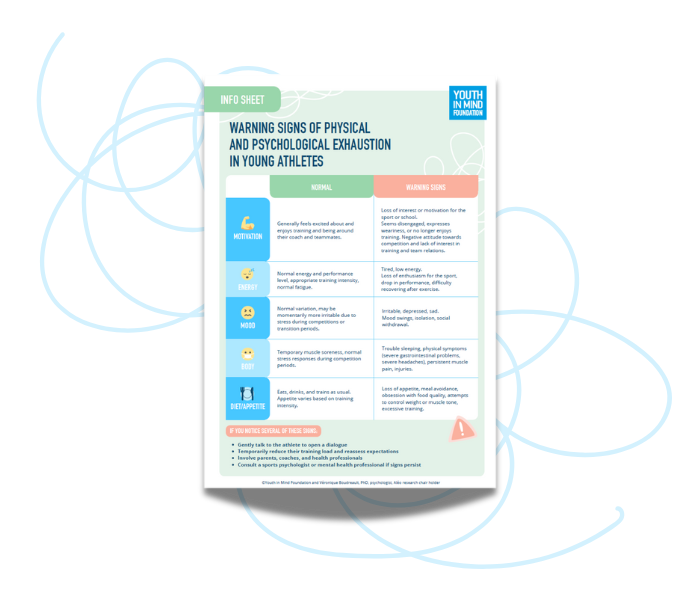3/3
How to support mental health and balance in young athletes
3/3
How to support mental health and balance in young athletes
Co-author: Véronique Boudreault, PhD, PsyD, professor at Université de Sherbrooke and holder of the Aléo Research Chair
The well-being of young athletes depends not only on their performance, but also on their environment. Parents, coaches, health care professionals, and other stakeholders all have a role to play in supporting young athletes, both on and off the field!
In this third and final article in our series on sports and mental health in collaboration with CF Montréal and Véronique Boudreault, PhD, we talk about concrete strategies to promote well-being in young athletes, reduce excessive pressure, and help them better manage the challenges of sport.
👉 Related reading:
Play on: the positive impact of sports on teens
Teens and sports: when pressure takes the joy out of the game
In collaboration with CF Montréal
FOCUS ON FUN AND PERSONAL DEVELOPMENT 🏃
It’s essential to encourage a positive attitude toward sports in the family from a young age. Too often, the focus is on results and performance. But it’s young athletes’ effort and learning that lead to progress and help them build a healthy, lasting, and positive relationship with their practice.
Try developing these simple reflexes:
👉 Ask open-ended questions after competitions or training sessions, like “How did your practice go today?” or “What did you learn?” rather than immediately asking about wins or points.
👉 Praise their commitment, perseverance, and ability to adapt, rather than just their results. This will teach them that the important thing is to grow, not to be perfect at any cost.
👉 It’s also important to recognize that motivation can ebb and flow, so you should avoid comments like “If you want to succeed, you need to push yourself.” Here are some things to say instead:
“Everyone has days where they feel less motivated, don’t worry about it.”
“What matters is that you keep progressing one step at a time.”
“I know you always try your best, even when it feels harder than usual.”
“What matters to me is that you feel good and enjoy yourself.”
👉 Accept that their sporting career may evolve and value what sport brings beyond performance: self-confidence, discipline, friendships, emotional management.
👉 Make time to talk about things other than sports to give them a break and help them see that their identity isn’t solely tied to their role as an athlete.
👉 Whether you’re a parent or a coach, allowing young athletes to explore different disciplines before they specialize in one sport is a win-win strategy.1
PROMOTE A CLIMATE OF SUPPORT AND PSYCHOLOGICAL SAFETY 👨
In order for an athlete to thrive, they need to feel heard, respected, and supported, regardless of their performance.
With the right attitude, you create a caring environment that’s conducive to their overall development:
❌ Avoid comparing teens to others or setting outcome-related goals for them. Excessive pressure—even silent pressure—can lead to stress, anxiety, and a loss of enjoyment.
✅ See failure as a learning opportunity. Everyone progresses at their own pace.
❌Don’t turn sports into a financial or emotional issue. The investment of time and money in a child’s athletic career should never be turned into implicit pressure.
Avoid saying things like: “With all the money we’re investing, you’d better be serious” or “We’re making sacrifices so you can succeed.” These kinds of statements can generate a sense of guilt and responsibility that will interfere with the child’s enjoyment. Remember, not all young athletes will reach the elite level, and that’s completely normal.
✅ Here are some alternatives to try instead:
“I’m proud of the effort you’ve put in, whatever the outcome.”
“The most important thing is that you have fun and do your best.”
“What counts is what you learn through sport.”
“We’ll support you, no matter how far you want to go.”
“What’s important is your well-being and your enjoyment of the game.”
✅ When a young athlete tells you that they are stressed out before a competition, validate their emotions with phrases like: “It’s normal to feel nervous before an important event.” Ask them questions that will help them soothe their anxiety:
“What has helped you in similar situations in the past?”
“What do you need to feel calmer right now?”
“Do you want to talk about it, or would you rather we did something else to take your mind off it?”
“How would you like me to encourage you before and during your competition?”
BE A POSITIVE ROLE MODEL 👀
Teenagers are still constructing their own identity and tend to mimick the behaviours they see around them. This means that if you’re caring and understanding with your child, but hard on yourself, they might be hard on themself in turn.
❌ Avoid criticizing yourself harshly when you make a mistake.
✅ Show them that mistakes are normal and part of the learning process: sharing your own challenges and how you handle them with kindness is a powerful lever for cultivating resilience in youth.

WATCH FOR SIGNS OF STRESS OR BURNOUT 😞
Being too committed to a sport or overtraining can lead to physical and mental overload. Here are a few warning signs:
- Irritability
- Fatigue
- Loss of enthusiasm
- Sudden drop in school performance
- Chronic pain
- Frequent injuries
- Disinterest in other activities
- Isolation
If you notice any worrying signs, share your concerns with the young athlete in a factual but caring way. Consult a mental health professional if necessary.
📌In the info sheet below, you’ll find a summary table of the warning signs of physical and psychological exhaustion in young athletes.
Download info sheetSTRIKE THE RIGHT BALANCE BETWEEN SPORT, STUDIES, AND SOCIAL LIFE ⚖
As a parent, you can help your teen maintain a balance between their training, studies, and social life by:
- Valuing other aspects of their life
- Encouraging them to make friends outside their sport and explore other interests and activities
- Ensuring they get enough rest and quality sleep
- Reminding them that recovery is an integral part of training and essential to avoid injury and excessive fatigue
- Planning family time that doesn’t involve sports, such as having a board game night or going to a concert
- Showing them that you yourself make room for other pursuits
- Making room for boredom; it encourages creativity and helps with mental recovery
As a coach, you can help prevent fatigue and exhaustion by adjusting your athletes’ training loads.2 An intense training schedule must be balanced out with adequate rest. Too often, young athletes fall into the trap of overtraining because they think doing less means they won’t perform as well.
FOSTER BODY POSITIVITY AND A HEALTHY RELATIONSHIP WITH FOOD 🍽
Nutrition also plays a key role in young athletes’ performance and well-being. It’s essential that when you talk about nutrition, you focus on well-being and energy rather than weight, performance, or appearance. Encouraging healthy eating habits without guilt or restriction will help them build a healthy relationship with food.
📌 Discover ÉquiLibre’s toolkit for coaches to foster a positive relationship with body, food, and sport in athletes:
Toolkit for coaches (available in French only)ACT AS A SUPPORT TEAM 🤝
Parents, coaches, and mental health professionals all have a complementary role to play in promoting a fulfilling, balanced, and sustainable athletic experience.
This involves:
- Open and respectful communication between adults. Avoid criticism in front of young athletes and encourage regular dialogue about their overall well-being.
- Involve young people in the decisions that concern them (schedules, goals, life balance, etc.) as a way to validate their opinions and develop their autonomy.
- Build a climate of trust where expectations are clear, effort is valued, failure is normalized, and emotions are accepted without judgment or punishment.
Together, we can support youth in their sporting careers while protecting their mental health. 💙
ADDITIONAL RESOURCES
Play on: the positive impact of sports on teens
Teens and sports: when pressure takes the joy out of the game
Warning signs of physical and psychological exhaustion in young athletes
In collaboration with
Sources
1Jean Côté, Jennifer Turnnidge and M. Blair Evans, “The Dynamic Process of Development Through Sport,” Kinesiology Review 3, no. 1 (2014): 3–12.
2Gustafsson, H., et al. (2018). Burnout in competitive and elite athletes: A systematic review. International Review of Sport and Exercise Psychology, 11(1), 152-174.



